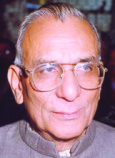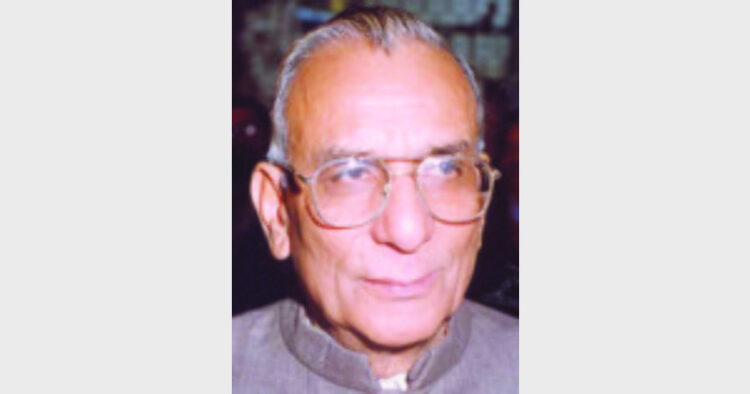London attack on General Brar revives militancy talk
Shyam Khosla RECENT dastardly attack on Let-Gen (retd) Kuldip Singh Brar outside his London hotel has shaken out of slumber India’s security establishment. At long last, it seems to have realised that remnants of Sikh militancy and separatism pose a serious threat to peace and social harmony in Punjab. Various agencies, including the National Investigation Agency (NIA), are now taking a closer look at pro-“Khalistan” activism in the country and abroad and fund raising by radical elements under the garb of working for the welfare of “victimized” Sikhs. One of such outfits is Sikh Organization for Prisoner Welfare (SOPW) masquerading as a voluntary body raising funds to assist “innocent Sikhs languishing in jails”.
RECENT dastardly attack on Let-Gen (retd) Kuldip Singh Brar outside his London hotel has shaken out of slumber India’s security establishment. At long last, it seems to have realised that remnants of Sikh militancy and separatism pose a serious threat to peace and social harmony in Punjab. Various agencies, including the National Investigation Agency (NIA), are now taking a closer look at pro-“Khalistan” activism in the country and abroad and fund raising by radical elements under the garb of working for the welfare of “victimized” Sikhs. One of such outfits is Sikh Organization for Prisoner Welfare (SOPW) masquerading as a voluntary body raising funds to assist “innocent Sikhs languishing in jails”.
NIA says it has evidence that several militant outfits have close links with Pakistan ISI. Radical elements among Sikhs settled in UK, Belgium, Germany, Canada and USA are actively involved with these foreign-based pro-“Khalistan” outfits. They regularly hold demonstrations in several cities, including London, in support for the demand of a separate homeland. Brussels is yet another centre of these anti-national outfits. It was in the Belgium capital that Sant Parmanand of Dera Sach Khand was attacked by Sikh militants in 2009 that created a lot of concern in Punjab.
Danger signals were aplenty before the assassination attempt on Brar. The Union and State Governments chose to shut their eyes to the stark reality hoping Sikh militancy would fade away in the absence of mass support. Two instances would suffice to show that only few support separatism but there is empathy enough for militants – slain or alive – to frighten the Akali leadership to submission. In March 2012, an orchestrated campaign was launched to save from the gallows a former police constable Balwant Singh Rajoana who was handed down death sentence for assassinating Chief Minister Beant Singh. The judicial order for hanging Rajoana created a political storm in the state. Sikh high priests issued an edict to the Akali Dal and the SGPC to seek clemency for the convict. SGPC controlled by the Akali Dal promptly petitioned the President of India for mercy. Several Sikh parties, including certain radical outfits, observed a Punjab bandh protesting against the order to hang the convict. Angry demonstrations in Punjab and J&K marked the bandh during which pro-“Khalistan” slogans were raised at some places. Tension gripped the state but fortunately there was no large scale violence, only some skirmishes. Radical groups and underground militant outfits made fun of State Government’s attempts to seek clemency and said Rajoana had steadfastly refused to seek mercy from the system in which “he had no faith”. Pamphlets issued on behalf of underground outfits demanded a separate homeland. Yet Chief Minister Parkash Singh Badal rushed to Delhi and called on the President and the Prime Minister to plead clemency for the convict. The President promptly forwarded SGPC’s mercy petition to the Home Ministry for its advice. The same evening the Union Government issued an order postponing Rajoana’s execution till the final disposal of the petition by the President or disposal of an appeal in the case by a co-accused by the apex court “whichever is later”. Interestingly, Badal tried to persuade BJP leaders to accompany him to meet the President but his alliance partner declined reiterating its stand against all kinds of terrorism.
The second warning – more pronounced and having more dangerous implications – was the building of a “martyrs” memorial in the Golden temple complex just opposite Akal Takht in honour of those killed during Operation Blue Star. Make no mistake. It was neither in memory of police and army officers and jawans who were killed during the operation nor was it to commemorate thousands and thousands of innocent citizens – Sikhs as well as non-Sikh Hindus – who were gunned down during the dark decades of militancy. SGPC clearly stated that the memorial would remind generations about the army attack on the temple and that it was to commemorate the sacrifices of the “martyrs” who fought against the army. The construction work was assigned by the Sikh clergy to the Damdami Taksal – the seminary once headed by Bhindranwale. The Union and State Government remained mute spectators as if nothing worrisome had happened. The BJP did condemn it as “anti-national” but didn’t take the issue to its logical conclusion. The only sane voice came from a group of eminent citizens of
Chandigarh who emphatically stated that the memorial would only revive the horrible memories of dark decades and would open old wounds leading to social disharmony. No one in authority was moved by the voice of the voiceless.
These developments have revived the frightening memories of the dark decades of 1980s and 1990s that brought the border state of Punjab to the brink of a disaster. A violent separatist movement for an independent Sikh home land had rocked the state, heightened communal tensions and consumed several thousand innocent citizens, security personnel and terrorists. Army action on the Golden Temple complex to flush out terrorists followed by the assassination of Prime Minister Indira Gandhi and massacre of thousands of innocent Sikhs in Delhi and other parts of the country are extremely sad chapters of our recent history. It is the sacred duty of the Union and State Governments to ensure that Punjab is not pushed into yet another bout of insurgency.
Lt Gen Brar who bravely fought back the attackers to survive the attempt to his life has given a timely warning to the Government. He said he was extremely worried over the construction of the Operation Blue Star memorial in the precincts of the Golden Temple in Amritsar and cautioned the Centre that its failure to step in to stop the construction of the memorial would mark the return of Bhindranwale days of 1980s. Union Home Minister Sushil Kumar Shinde’s response that the Government wouldn’t interfere with what is happening in the temple complex is most disappointing as the Government is once again shirking its responsibility in matters of national security and territorial integrity of the country. Home Minister’s stand is all the more intriguing in the backdrop of sections of Sikh clergy honouring relatives of killers of former army chief AS Vaidya in a function held in the Golden Temple. While Punjab leaders Capt Amrinder Singh and Balramji Das Tandon belonging to Congress and BJP respectively have expressed grave concern over the increasing space being given to militants, the Centre seems to have foreclosed its options. Congress party’s track record of mishandling Punjab in 1980s led to two decades of pro-“Khalistan” terrorism. The party had promoted then little known priest Jarnail Singh Bhindranwale to divide Akali Dal’s Sikh vote bank. Bhindrawale led the violent movement as the Centre looked the other way as Bhindrawale took shelter in the shrine, stacked it with sophisticated arms and ammunition smuggled from across the border and trained fighters under a former general. Government is again on a similar self-destructive path. Nationalist forces must rise and launch a peaceful movement against government’s non-policy on Punjab, if the state is to be saved from yet another catastrophe.














Comments